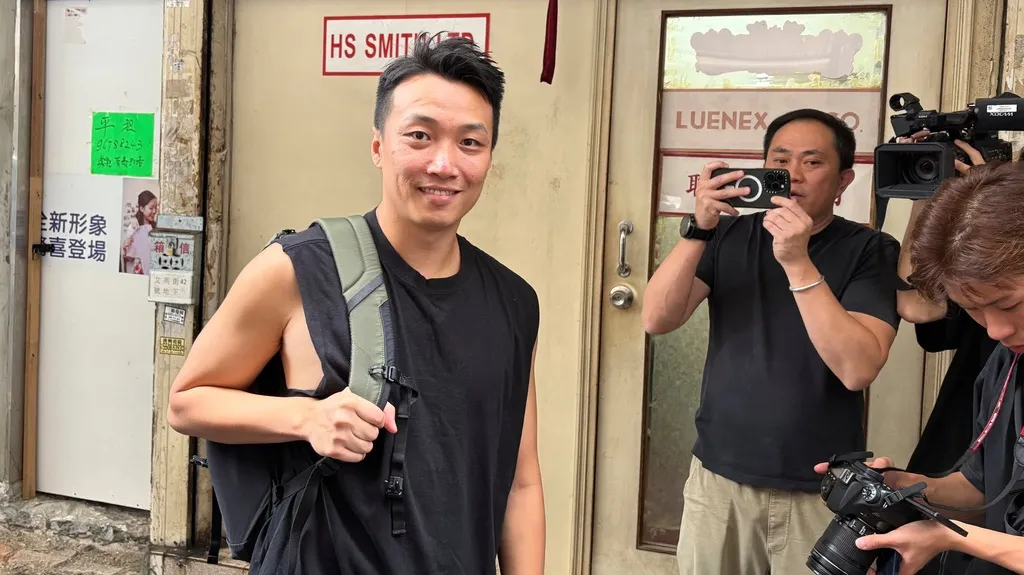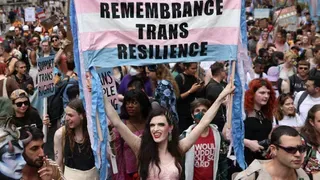December 1, 2018
World AIDS Day Interview: 'Walking Dead' Star Danai Gurira
Kilian Melloy READ TIME: 7 MIN.
Though born in Iowa, "Walking Dead" and "Avengers: Infinity War" star Danai Gurira grew up in Zimbabwe, where her parents returned when she was five years old. Gurira came back to the United States after high school and, after completing undergraduate work in St. Paul, turned to the dramatic arts, earning a Master of Fine Arts in acting from the Tisch School of the Arts at New York University.
After stints on various television shows, Gurira landed a recurring role on the HBO drama "Treme," but it was with her role as the katana-toting Michonne on "The Walking Dead" that Gurira really broke through. With her casting as the fierce warrior Okoye in the films "Black Panther" and "Infinity War," Gurira became well established in the big leagues.
But acting isn't Gurira's only passion. She's also an accomplished playwright whose HIV-themed "In the Continuum," won her a small shelf-load of awards, including an Obie. More acclaimed plays followed, including 2009's "Eclipsed," a play about the costs of male-driven conflicts that women bear. "Eclipsed" hit Broadway with an all-black, an all-female, cast and crew.
In 2016 Gurira founded Love Our Girls, a non-profit that advocates for women across the world. That same year, Gurira partnered for the first time with Johnson & Johnson for World AIDS Day, speaking out in support of educational and preventative measures to halt the spread of HIV.
In the last 35 years, 78 million people worldwide have contracted HIV; today, as efforts to combat the disease continue, nearly 40 million people are still living with the disease, and while there's been remarkable progress in treatment and prevention, 2017 saw 1.8 million new cases of HIV infection. Women are hard hit, comprising half the new cases; on average, 1,000 women are infected with HIV every day.
Gurira has partnered with Johnson & Johnson once again for this year's World AIDS Day. EDGE caught up with the busy actor by phone recently, after she had already put in long hours of filming in London. The day's hard work did nothing to dampen Gurira's enthusiasm; she spoke passionately about her advocacy and the need to inform and educate people worldwide on the facts about HIV and how to prevent its spread, all with the goal of eradicating AIDS within our lifetimes. As Gurira told EDGE, "It's only impossible until it's done." Taking on the impossible is, of course, the very definition of a superhero.
EDGE: You've partnered with Johnson & Johnson for a few years now, speaking out about AIDS. Having grown up in Zimbabwe, did you see the ravages of the epidemic on communities and families? Is this personal for you?
Danai Gurira: Yes - I grew up witnessing how AIDS affected my nation's life and way of life in the 80s and 90s. It was something I became very aware of. I became invested in speaking out about it as much as I possibly could. I saw how it affected Americans, but also how it was an issue that has affected Africans; it's definitely something that's very important to me, to give my support to those who are on the front lines as much as I can.
EDGE: You've lived and worked in different countries, and you speak several languages - do you see yourself as a "citizen of the world," and if so, how does that play into your advocacy work?
Danai Gurira: That's so kind of you – I do not speak several languages; I sure wish I did! I speak maybe two or two and a half, tops, on a good day.
[Laughter]
But, you know, I definitely think that having been born in the United States and raised in Zimbabwe and having spent time in other nations all around the globe, I feel we should be aware of one another, and be aware that we are all one family, one human race. It's very much about how I can have awareness and empathy and connection to the troubles and the issues and experiences of people in different parts of the world. There's far more that connects us than that separates us.
EDGE You're known for portraying Michonne on "The Walking Dead," and also, more recently, for your role as Okoya in the Marvel Cinematic Universe films "Black Panther" and "Infinity War," among other high profile roles. Have you found that the sort of visibility you have achieved professionally has given you a larger platform for speaking out on this issue?
Danai Gurira: Thank you for that. To whom much is given much is expected, as the good book says, so I do try to utilize whatever platform I do have to give voice to those affected by this issue. I try to do that through my roles. The more I can give voice to others and to this issue, and be a real champion of it in various ways, that's my goal. Right now, I'm very excited to be working with Johnson & Johnson again on this issue. Making HIV history is something that I definitely wanted to partner with them on. [The goal is to] eradicate AIDS in our lifetime. As it's said, it's only impossible until it's done; I believe it's possible to get it done.
EDGE: You're also acclaimed as a playwright, and your play "In the Continuum," addresses the issues of women living with HIV. Do you have other theater or film projects that take on the issue of AIDS that you are planning or that you'd like to do?
Danai Gurira: Oh, certainly. I think it's something that affects the fabric of lives in so many ways, and my goal is to help tell stories from the African female perspective – we definitely see how this issue disproportionately afflicts African women. And so, absolutely, it's something that comes up again and again in my work. As we look towards ending AIDS, we want to tell the stories of the lives that have been affected by it.
EDGE In another of your plays, "Eclipsed," you explore how women bear the brunt of wars that men engage in; that's an interesting parallel to how women have been affected by the global AIDS epidemic.
Danai Gurira: That's what I'm saying - that's really why I created "In the Continuum," because the statistics around women and how they are disproportionately affected, and the disproportion of power around women, which actually exacerbates how women are affected by this issue is something that I witnessed growing up, and that I wanted to give voice to - especially for women who are often looked at more as statistics than as [people]. It was very important to me to tell stories from the perspective of those who don't get to be heard very often, even as they are dealing with the brunt of it, which is African women.
EDGE: Early on, AIDS was, unfortunately, politicized. What can ordinary people in the U.S. and elsewhere do to work around that politicizing of the disease and help in the global fight against the AIDS epidemic?
Danai Gurira: I think one of the biggest things that's really exciting about what we're doing with Johnson & Johnson right now is about awareness. The fact is that there has been a rise of [new HIV] cases in recent years in the United States, and that is something that I think we need to bring more awareness to, and highlight this issue again.
We need to focus on how we can eradicate it through awareness; that's what allowed us to make strides [against the epidemic]. I've seen that in the United States, and I saw that in Zimbabwe. Awareness made a difference. If people know and they are educated and they're connected to an issue, they can become advocates and activists; they can function in a way that brings about change and allows an issue to achieve some sort of closure.
This World AIDS Day, Johnson & Johnson is encouraging people to participate through social media – through things as simple a gifs, in terms of using them in their Instagram stories and postings that bring direct awareness to the fact that 37,000,000 people worldwide are affected, promoting the idea of making HIV history, and sharing symbols for HIV/AIDS – everything that brings awareness back to the issue, because I think there are times when awareness can fall away. We can get a bit complacent when we think that the problem has been handled. But it hasn't. We're still on the front lines, and we're still trying to get to the finish line.
EDGE: So, education and participation sound like they are key.
Danai Gurira: Exactly, that's exactly it.
Kilian Melloy serves as EDGE Media Network's Associate Arts Editor and Staff Contributor. His professional memberships include the National Lesbian & Gay Journalists Association, the Boston Online Film Critics Association, The Gay and Lesbian Entertainment Critics Association, and the Boston Theater Critics Association's Elliot Norton Awards Committee.




